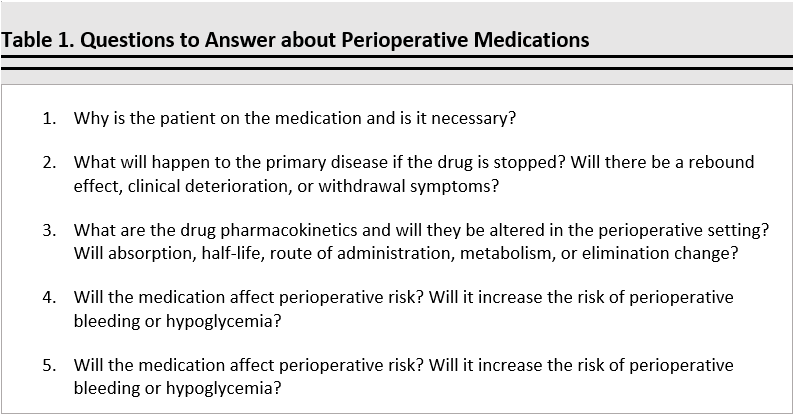Principles of Perioperative Medication Management
Introduction
With advances in surgery and an aging population, more surgical procedures are being performed. The vast majority of these surgical patients take one or more prescription or over-the-counter medications. The medical consultant/hospitalist and surgical team (surgeon and anesthesiologist) must work with the patient to manage these medications in the perioperative period.
Among the National Patient Safety Goals established by The Joint Commission are improved safety of medication use and complete and accurate medication reconciliation across the continuum of care. Unfortunately, few physicians have received formal training in perioperative medicine management and there are no randomized trials to guide perioperative management of most medications, which leads to substantial physician-to-physician variations in management. This module is based on a review of the available evidence and expert consensus.
Principles
The physician should obtain a thorough medication history from the patient and perform a complete medication reconciliation. Inquire about all medications: prescription, dietary supplements, and over-the-counter medications. Many patients use non-prescription medications and do not mention these to their physicians. Ascertain compliance—ask whether the dose prescribed is what is actually being taken. In order to make recommendations regarding perioperative medication management, you should be able to answer several questions about each medication (Table 1).

Based on this information and a risk-benefit analysis, the consultant needs to decide whether to continue, discontinue, or modify the regimen for each medication. Certain medications are essential and need to be continued. A small number of medications need to be discontinued or have dose adjustments made perioperatively because of potential adverse effects. Many others are neither essential nor detrimental, and the decision to continue or discontinue them preoperatively is optional. Because it is beyond the scope of this module to review all medications, only those felt to be most important or most common are discussed. The use of prophylactic medications will not be addressed. A more extensive review can be found in other online references.1
In summary, the medical consultant/hospitalist needs to obtain a complete list of medications, conduct a risk-benefit analysis based the best available evidence, and decide which drugs need to be discontinued and which drugs need a dose adjustment.
